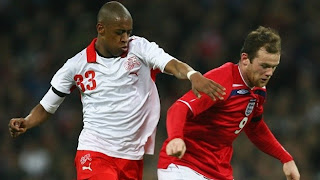 How did they perform in UEFA EURO 2008™ qualifying?
How did they perform in UEFA EURO 2008™ qualifying?
• The most consistent performers in a competitive Group E, Croatia qualified with a game to spare thanks to Russia's defeat in Israel – news of which filtered through to the team halfway through their 2-0 defeat in F.Y.R. Macedonia.
• It was the only defeat suffered by Croatia during an impressive first campaign under former international defender Slaven Bilić.
• They began with a useful 0-0 draw in Russia and took off the next month with a 7-0 win against Andorra, Mladen Petrić's four goals helping Croatia equal their previous record win,7-0 against Australia in 1998.
• Four days later, on 11 October 2006, Croatia got an even better result, 2-0 at home against England.
• Having scored against England, Brazilian-born striker Eduardo da Silva netted a hat-trick as Croatia won 4-3 in Israel in their next game.
• With ten goals overall, Eduardo finished as the second top scorer in qualifying behind Northern Ireland’s David Healy.
• Croatia saved the best for last, their 3-2 win against England at Wembley on 21 November 2007 confirming first place in the section and ending their hosts' hopes of qualifying. "We are good – very good," said Bilić.
How did they perform in the 2006 FIFA World Cup?
• Croatia topped their group with seven wins and three draws from their ten 2006 FIFA World Cup qualifiers. Although Sweden also finished with the same points total, the Croatians held the stronger record in direct matches involving the two group principals. In total, Croatia scored 21 times with five goals conceded.
• Their key victory came in their second match in the qualifying competition. Having dismissed Hungary's challenge with a 3-0 win in Zagreb in their opener after opposing defender Szabolcs Huszti was dismissed after eleven minutes, Croatia won in Sweden thanks to Darijo Srna's 64th-minute free-kick.
• Although Croatia would be held to draws at home against Bulgaria (2-2) and away against Malta (1-1), they won the return matches against those opponents as well as defeating Iceland home and away.
• This set up their crucial second meeting with Sweden in Zagreb in their penultimate fixture, a match the Croatians won thanks to Srna's 56th-minute penalty. Their final fixture ended in a scoreless draw away against Hungary, enough to confirm their first-place finish.
• Croatia lost 1-0 to Brazil before 0-0 and 2-2 draws against Japan and Australia respectively in the group stage of the finals.
• Josip Šimunić and Dario Šimić were both sent-off in Croatia's final game against Australia as they went out of the tournament at the first hurdle.
How did they perform in UEFA EURO 2004™?
• Croatia advanced to the UEFA EURO 2004™ final tournament via the play-offs after finishing second to Bulgaria in the qualification phase. With five victories and a draw from their eight matches, the Croatians trailed the group winners by a point, but finished ahead of Belgium due to their superior goal difference in the direct matches between the two teams.
• It was in their first match against Belgium, their third in the qualifying campaign, that the Croatians finally found their feet. Having opened the competition with a scoreless home draw against Estonia, the Croatians were then on the receiving end of a 2-0 defeat away against Bulgaria. Belgium then bore the full brunt of Croatian wrath in Zagreb as the home side ran out 4-0 winners thanks to goals from Srna (9), Dado Pršo (55), Tomislav Marić (70) and Jerko Leko (76).
• They would not concede a goal for 448 consecutive minutes before a brace from Wesley Sonck (35, 43) in Brussels helped Belgium to avenge their earlier defeat with Marco Rapaic (37) scoring Croatia's goal.
• The Croatians then held their nerve in their final game, defeating the already-qualified Bulgaria thanks to Ivica Olić's 48th-minute goal at Zagreb's Maksimir stadium.
• Their reward was a two-legged play-off against Slovenia, the Croatians winning 2-1 on aggregate, despite being held to a 1-1 draw at home in the opening leg. They took the lead through Pršo after five minutes only for Ermin Siljak to equalise midway through the half. But Croatia would go on to stun Slovenia in Ljubljana, Pršo scoring the only goal of the game shortly after the hour mark.
• Croatia failed to advance beyond the group stage in Portugal, recording two draws and a defeat from their three outings. Those draws came in their opening two engagements against Switzerland (0-0) and France (2-2) before they were outgunned by England (4-2) in their last match.
What is their best performance in the UEFA European Championship?
• Croatia's best performance to date came in their first involvement in the competition. Having topped their qualification round group for EURO '96™ with 23 points from ten games, the Croatians were pitched against Denmark, Portugal and Turkey in the final tournament group phase. Opening with two victories against Turkey (1-0) and Denmark (3-0), the Croatians qualification for the knockout phase was guaranteed prior to their 3-0 defeat against Portugal in their last match. Facing eventual winners, Germany, in the quarter-final phase, the Croatians exited following a 2-1 defeat.
Key facts
• Croatia have missed only one UEFA European Championship final tournament since independence, missing out on a trip to UEFA EURO 2000™.
All-time record
• Up until the end of qualifying for UEFA EURO 2008™, Croatia had appeared in the UEFA European Championship on four occasions, and had played 47 matches. In that time, they had won 28, drawn eleven and lost eight with 86 goals scored and 38 conceded.


































